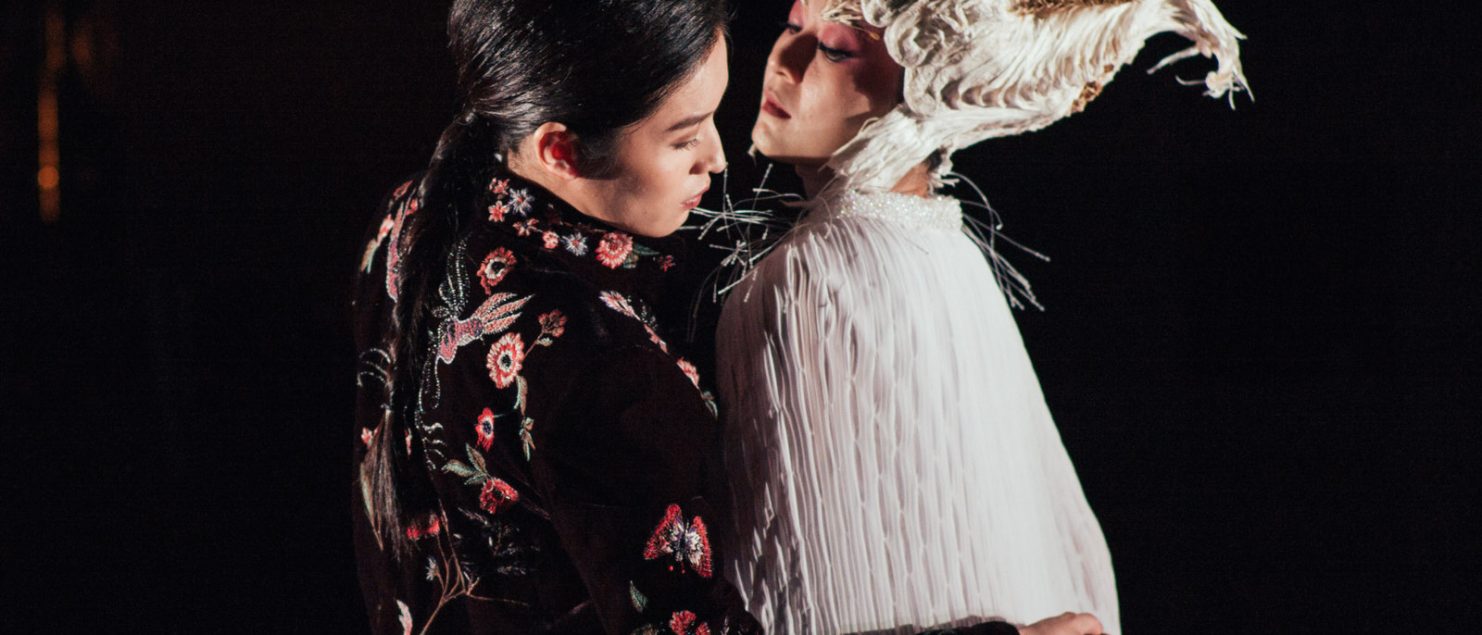Catch up Kuang Qi’s international premiere at Bangkok International Performing Arts Meeting, Nov. 15 to 17
A daring experimentation of traditional Chinese opera arts through the approach of contemporary theatre
Live music hybrid of Chinese Luogu and modern Western percussion
Exclusive international premiere at the inaugural “Bangkok International Performing Arts Meeting” (BIPAM)
KUANG QI
Genre: Music Theatre
Venue: Sodsai Pantoomkomol Centre for Dramatic Arts
Faculty of Arts, Chulalongkorn University
(10-minute walk on Henri Dunant Road from BTS Siam, Exit 6; discounted parking in Maha Chakri Sirindhorn Building)Date & Time: Wednesday and Thursday, November, 15 & 16, 2017 at 7:30pm
Friday, November 17, 2017 at 2pm and 8pmTickets: Bt 600 (Students: Bt 300; Artists and audiences younger than 27 years old: Bt 400), available now at www.BangkokTheatreFestival.com, or by calling 08 1559 7252 and 0 2218 4802
*In Mandarin and Thai, with English surtitles*
As part of “BIPAM Showcase” in the inaugural “Bangkok International Performing Arts Meeting”, Ministry of Culture, Republic of China (Taiwan), Taipei Economic and Cultural Office in Thailand and the “World Performances @ Drama Chula” programme by Department of Dramatic Arts, Faculty of Arts, Chulalongkorn University present KUANG QI by M.O.V.E. Theatre at Sodsai Pantoomkomol Centre for Dramatic Arts, for four performances only from November 15 to 17. A “music theatre” work rarely seen in Thailand, KUANG QI combines traditional opera, a traditional opera percussion ensemble, contemporary music, body movements and theatre.
The story revolves around two noted female characters of Chinese Opera, Du Li-niang from THE PEONY PAVILION and Zhu Ying-tai from THE BUTTERFLY LOVERS. What if it were not actually a handsome man that Du Li-niang sees in her dreams, but a woman in man’s disguise? Would her desires and repression remain the same? The 400-year-old classic THE PEONY PAVILION has drawn a lot of attention from the feminist community, as its main character Du Li-niang is seen as defying tradition and old feudal thinking. KUANG QI uses the female archetype in traditional opera to delve into female desire and its transformation. With language and body movements as means of expression, the piece exhibits a high level of gender awareness that transcends time and space.
KUANG QI attempts to be free from the stereotypical norms and rules. M.O.V.E. Theatre’s resident composer and music director Lin Kuei-ju, recipient of Taishin Arts Award 2013, detaches the work from the original indication of traditional Gongs and Drums Notation. The musical composition creates a refreshing dialogue performed by percussionists from both reign of the Western and the Eastern training. The masculine dynamics depict the female struggles under social norm, while the fluid soundscape implies the bourgeoning desire.
M.O.V.E. Theatre was founded by artistic director Fu Hong-zheng in 2006. M.O.V.E. Theatre provides artists with a creative space for exploring the aesthetics of physical theatre through movement, observation, and experimentation. Composed of artists from a variety of artistic disciplines—including theatre, music and dance—the troupe is dedicated to creating works that could be described as total theatre. They typically feature a poetic theatrical style of language that probes and reveals the minds of people today, with themes covering literature, mythology, history, society and more. The troupe also works with contemporary artists from different backgrounds to create interdisciplinary experimental works.
Pawit Mahasarinand, BIPAM committee member and chairperson of Chulalongkorn University’s Department of Dramatic Arts, has been appointed a member of Southeast Asia Advisory Committee (SEAAC) by Taiwan’s Ministry of Culture, and has been consulting with many Thai and Taiwanese artists, scholars and producers in selecting KUANG QI for BIPAM.
“It’s been many years since we watched and enjoyed contemporary performing arts from Taiwan and yet the memory of performances by Cloud Gate Dance Theatre and U-Theatre is still fresh. The contemporary arts scene in Taiwan is really thriving and that makes it more difficult to choose one work for BIPAM. It came down to two keywords in the end—‘interdisciplinary’ and ‘experimental’. KUANG QI is probably the highest artistic risk M.O.V.E. Theatre, a physical theatre company, has ever taken and I personally admire artists who do not just sit in their comfort zone and create works in the same old recipe that they’re certain their audience will like. Watching a rehearsal of KUANG QI in Taipei two months ago, I felt unique bursts of energy from its intriguing soundscape and captivating physical movements and acting and enjoyed the queer re-interpretation of the two traditional stories. And thus I’m sure that BIPAM audiences will enjoy a glimpse of and learn about contemporary Taiwan from watching KUANG QI and that performing arts collaboration and exchanges between the two countries will be re-energized.”
KUANG QI had its world premiere at Taiwan Traditional Theatre Center on September 29 this year. This exclusive international premiere at BIPAM is made possible through the kind support by Ministry of Culture, R.O.C. (Taiwan) and the Taipei and Economic Office in Thailand. Special thanks also to Department of Music, Faculty of Fine and Applied Arts, Chulalongkorn University.
Facebook: DramaArtsChula





